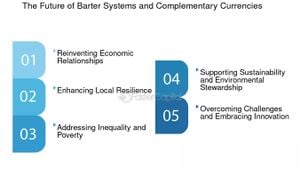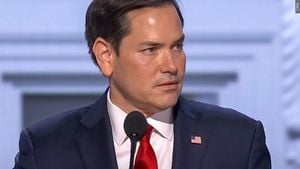The potential for Donald Trump's involvement in the Ukraine conflict has stirred considerable debate among analysts, political commentators, and international relations experts. With Trump poised to potentially reclaim the White House, many are wondering how his policies, particularly on Ukraine, might shift. This speculation intensifies as Ukraine stands at the crossroads of preserving its sovereignty and facing the relentless military advances of Russia. Recent reports suggest serious ramifications if U.S. support considerably wanes under Trump.
According to recent discussions, Ukraine could be perilously close to developing nuclear capabilities if military aid from the U.S. diminishes, setting off alarms across the globe. Observers note this shift is fueled by fears surrounding Trump’s past criticisms of substantial military assistance to Kyiv. If his administarion were to cut back aid or prioritize negotiations with Moscow over Ukraine's demands, it might embolden Russia even more.
President Volodymyr Zelensky has positioned Ukraine's military as reliant on Western support, particularly from the U.S. The showdown looms large as analysts predict increased hostilities. The fragile balance of power could tilt dramatically if Trump acts on promises to drastically reshape U.S. involvement and aid strategies.
One of the most alarming aspects raised by commentators is the assertion from the Institute for the Study of War, which points to Putin’s mounting demands for any peace negotiations. Trump's entry might spur Russia to exert even greater influence, demanding full capitulation from Ukraine, potentially destabilizing the very future of the region.
International sentiments are also divided. France's foreign minister recently expressed the importance of not jumping to conclusions about Trump's future actions. His administration will be closely watched to determine if there's any shift away from the current administration's support for Ukraine. "Any initiatives would need to be contingent on Ukraine's timing and needs," said Jean-Noel Barrot, emphasizing the necessity for Western support to not just wane under shifting political tides.
More concerning though, is the idea of improved relations between Trump and Putin. Discussions have been reported on how two leaders may find common ground, potentially sidelining Ukraine's interests. Following Trump's past declarations about wanting to negotiate peace within 24 hours, many analysts worry the ramifications could see Ukraine cornered, forced to accept unfavorable terms set by Russia.
Further complicate these dynamics is the recent uptick in drone and missile strikes from Russia on civilian infrastructure across Ukraine. With reports of intense attacks and mounting casualties, it’s clear the stakes are higher. Every day brings fresh strains on Ukraine as it braces for attacks, coupling the pressing need for foreign aid with the risk of capitulation to potential peace negotiations initiated by Trump.
While observers point to Trump's track record of wavering support for NATO and Ukraine, discussions around potential peace deals have already begun hinting at drafting terms. For example, analysts assert any peace process could include stipulations against Ukraine’s NATO membership and other concessions, signaling a possible shift toward recognizing Russia’s expanded influence.
Zelensky’s government faces immense pressure. While aiming to maintain foreign support and sovereignty, there is rising concern about the very real possibility of Russian victory being interpreted as a sign of Western weakness. This precarious situation forebodes potential shifts not just for Ukraine but could reverberate across the globe, particularly concerning China’s aspirations toward Taiwan.
Consequences of reduced aid or support could resonate across NATO countries as well, prompting debates on how much assistance to offer Ukraine. Trump's facilitation or hindrance of the war efforts could redefine geopolitical dynamics, leading to significant shifts based on offers made to Zelensky's government.
When Gauging potential outcomes, the question looms ever larger: will Trump's administration prioritize re-establishing relations with Russia at the expense of Ukraine's sovereignty and stability? The international response continues to be shaped by this pivotal moment, underscoring how leaders around the globe must contend with increasing tensions and shifting alliances.
Overall, Trump's potential re-entry could reshape the narrative surrounding Ukraine, shifting away from unconditional support to more transactional discussions concerning aid and diplomacy. The upcoming months will be pivotal as Ukraine navigates these tumultuous waters, trying to keep sovereignty intact against the persistent advances of Russian military might.



